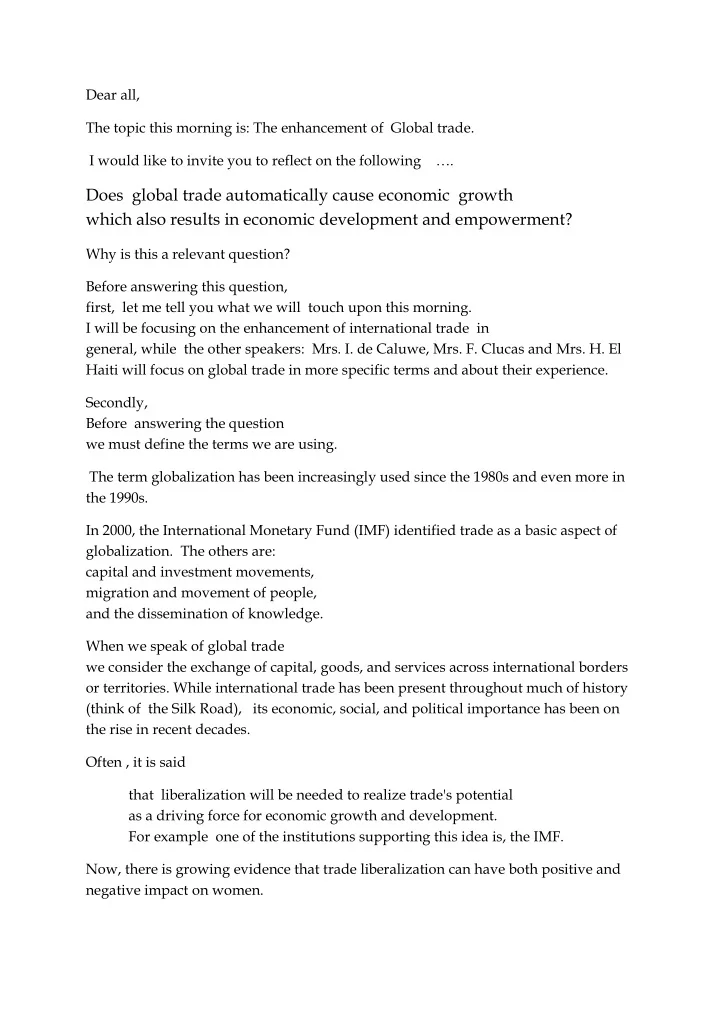

Dear all, The topic this morning is: The enhancement of Global trade. I would like to invite you to reflect on the following …. Does global trade automatically cause economic growth which also results in economic development and empowerment? Why is this a relevant question? Before answering this question, first, let me tell you what we will touch upon this morning. I will be focusing on the enhancement of international trade in general, while the other speakers: Mrs. I. de Caluwe, Mrs. F. Clucas and Mrs. H. El Haiti will focus on global trade in more specific terms and about their experience. Secondly, Before answering the question we must define the terms we are using. The term globalization has been increasingly used since the 1980s and even more in the 1990s. In 2000, the International Monetary Fund (IMF) identified trade as a basic aspect of globalization. The others are: capital and investment movements, migration and movement of people, and the dissemination of knowledge. When we speak of global trade we consider the exchange of capital, goods, and services across international borders or territories. While international trade has been present throughout much of history (think of the Silk Road), its economic, social, and political importance has been on the rise in recent decades. Often , it is said that liberalization will be needed to realize trade's potential as a driving force for economic growth and development. For example one of the institutions supporting this idea is, the IMF. Now, there is growing evidence that trade liberalization can have both positive and negative impact on women.
In regions were resources are equally distributed between men and women, trade liberalization can result in economic growth and empowerment of women. Well, the good news is, in only a few decades, health and education levels of girls and women have improved significantly, the bad news is, economic opportunities have not. Women consistently trail men in labor force participation, access to credit, entrepreneurship, inheritance and ownership rights and in the income they generate. All these limitations hold women back from participating fully and equally to men in this important and growing global economy. Worldwide, it is known that women are under-represented in higher income employment positions and few women are employers who hire others. And what about women working in export sectors ? They are paid 20 to 50 percent less than men, according to UNCTAD, the UN trade organization. Because they are paid less the overall wage gap between women and men has increased, which means decreasing the prospects for closing the gap. And don’t forget dear participants : This also has an impact on consumption. And it may also be reinforcing gender bias in the labour market. And how about the involvement of women in the primary sector? In the agricultural sector women produce 90% of the food for home consumption in the so called developing countries. But they are small-scale producers. Now, trade liberalization, by introducing import competition, tends to advantage larger producers.
The market access in turn, can be difficult for women to take advantage of all the opportunities it can create. This is because in many societies women lack access to key elements such as credit, modern technologies and marketing expertise. Considering all these: Can we say this is fair economics or smart economics? No, this is not fair economics and this is not smart economics. A host of studies has suggested that putting earnings in women’s hands is the intelligent thing to do to speed up development and the process of overcoming poverty. Women usually reinvest a much higher portion of their income in their families and communities than men, spreading wealth beyond themselves. This results in a trickle down effect which again results in economic development and poverty alleviation. In short term on community level, in the medium and long term at the national level and the international level. And …Considering women’s needs and concerns worldwide one may wonder: What has the World Trade Organization (WTO) done to incorporate women’s needs in terms of trade policies? The answer is, very little. Why is this the outcome? Trade policy is made on the basis of an assumption that trade policy and trade liberalization are gender neutral. Now, how can women be included more fully in the formulation of trade policy ? Virtually all World Trade Organization Member states, have endorsed the UN’s Beijing Platform for Action. And this legal instrument is the international reference point for governmental commitment to women's advancement and gender equality. It obligates governments to promote active and visible policies of integrating gender perspectives in all their policies and programs.
This dear audience, also includes economic policies. And we are aware that Subsequent UN resolutions place responsibility on international organizations, - including the WTO- to support government efforts to achieve the objectives of the Beijing Platform. Let me finish by saying: 1. Examination of the position of women in enhancing global trade could provide guidance for the on-going implementation of existing trade rules. 2. For fair economics and smart economics, Governments must include women more and more in the higher rankings to formulate policies. Also trade policies . Thank you all very much for your attention.
Recommend
More recommend